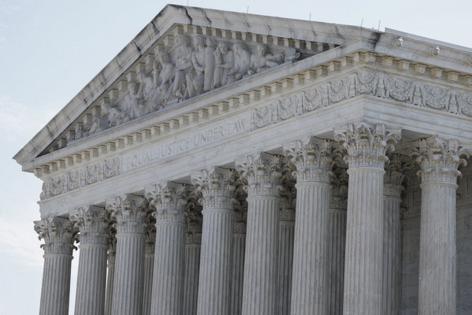Supreme Court allows civil lawsuits against Palestinian groups
Published in News & Features
WASHINGTON — The Supreme Court backed a 2019 federal law Friday meant to allow lawsuits against the Palestine Liberation Organization and Palestinian Authority for damages from terror attacks.
Congress passed the law stating the two organizations could be subject to lawsuits in the United States for activities such as processing payments for the families of individuals who attacked Americans or maintaining an office in New York.
In the opinion, all nine of the court’s justices agreed that the 2019 law did not violate the Constitution’s guarantees for due process. Two justices came to the same conclusion for different reasoning.
Chief Justice John G. Roberts Jr., in the main opinion joined by six other justices, wrote that the law “reasonably ties the assertion of federal jurisdiction over the PLO and PA to conduct that involves the United States and implicates sensitive foreign policy matters within the prerogative of the political branches.”
The majority opinion held that Congress’ intent to combat terrorism justified the attempt to allow civil lawsuits. The majority also pointed out that the federal government already has the authority to criminally punish efforts supporting violence against Americans abroad.
The law statute applies only to Antiterrorism Act cases, Roberts wrote, “a narrow category of claims that provide civil remedies only for Americans injured by acts of international terrorism.”
“It is permissible for the Federal Government to craft a narrow jurisdictional provision that ensures, as part of a broader foreign policy agenda, that Americans injured or killed by acts of terror have an adequate forum in which to vindicate their right to ATA compensation,” Roberts wrote.
Roberts wrote that the Constitution allowed a “more flexible” standard when dealing with the federal government’s ability to impose criminal or civil penalties on foreign entities than those in the United States.
The decision overturned a decision from the U.S. Court of Appeals for the 2nd Circuit that found the law violated the Constitution because the groups did not have enough ties to the U.S. to be brought into the nation’s courts.
The passage of the 2019 law followed several previous attempts to allow lawsuits against the Palestinian organizations. One had been invalidated by the courts as unconstitutional, and another was based on federal payments the organizations stopped accepting after the law was passed.
Justice Clarence Thomas, in a concurring opinion joined in part by Justice Neil M. Gorsuch, said he agreed with the final result of the case but he was “skeptical” the organizations should have constitutional rights, as they are foreign organizations the U.S. government has not recognized as representing a country.
Groups of American citizens, their estates and families sued under the law. They included the family of an American citizen stabbed in a 2018 attack in the West Bank and numerous other attacks.
The cases are Fuld et al., v. Palestine Liberation Organization et al., and United States v. Palestine Liberation Organization et al.
©2025 CQ-Roll Call, Inc., All Rights Reserved. Visit cqrollcall.com. Distributed by Tribune Content Agency, LLC.







Comments